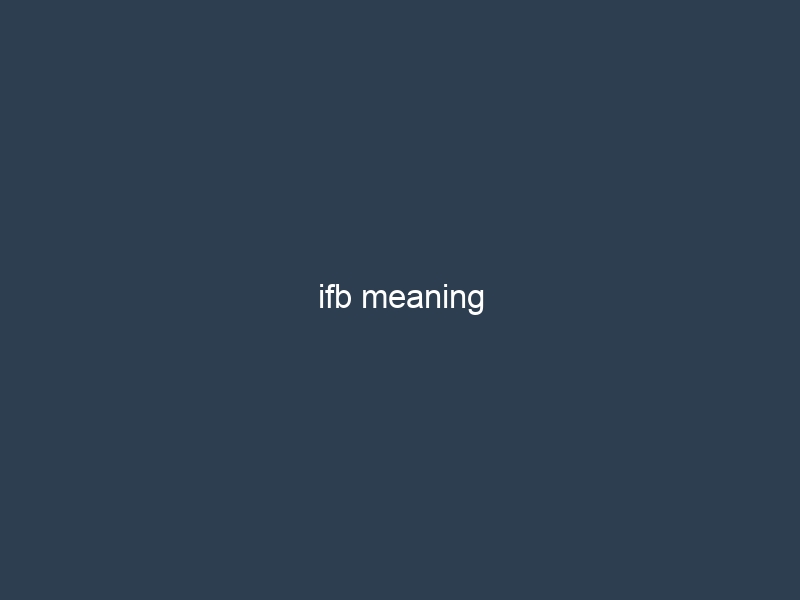Demystifying IFB: What Does IFB Stand For and What Does It Mean?
Are you familiar with the term IFB? You may have come across it in various contexts, but what does IFB stand for and what does it actually mean? In this article, we will demystify the meaning of IFB and its implications in different industries and scenarios.
What Does IFB Stand For?
IFB stands for “Invite for Bid.” It is a formal invitation to potential suppliers to submit a bid for a specific project or requirement. This process is typically used in government contracts, construction projects, and procurement of goods and services. The purpose of an IFB is to ensure fair competition among potential suppliers and to ultimately choose the best offer based on price, quality, and other relevant criteria.
When an organization issues an IFB, they are essentially signaling that they are open to receiving proposals from qualified suppliers who can fulfill the requirements outlined in the bid document. The process of responding to an IFB involves preparing a comprehensive bid that addresses all the specifications and terms laid out by the issuing organization.
What Does IFB Mean in Different Contexts?
While IFB originally stands for “Invite for Bid” in the context of procurement and project management, it can also have different meanings in other industries. In the context of broadcasting and media production, IFB stands for “Interruptible Fold Back.” In this application, IFB refers to a communication system used by directors, producers, and talent to communicate with each other during live broadcasts and recordings.
The IFB system allows for real-time communication of cues, instructions, and feedback between the production team and on-air talent without being heard by the audience. This enables seamless coordination and management of the production process, ensuring that everyone involved is on the same page and performing at their best.
Implications of IFB in Procurement and Contracting
When it comes to procurement and contracting, IFB has significant implications for both the issuing organization and the potential suppliers. For the organization, issuing an IFB means that they are committed to following a transparent and competitive process for selecting the best offer. This ensures that they are able to obtain the best value for their investment while demonstrating accountability and fairness in their procurement practices.
For potential suppliers, responding to an IFB represents an opportunity to showcase their capabilities and compete for a lucrative contract. It requires careful consideration of the bid requirements, thorough preparation of a competitive proposal, and adherence to the submission timeline and format. Winning an IFB can mean securing a long-term business relationship and revenue stream, making it a highly sought-after opportunity for many businesses.
Conclusion
In conclusion, IFB stands for “Invite for Bid” and carries significant implications in procurement, contracting, and media production. Understanding the meaning and significance of IFB is crucial for both organizations issuing bids and potential suppliers responding to them. It represents a commitment to fair competition, transparency, and value-driven decision-making in the selection of suppliers and contractors. In the context of media production, IFB facilitates seamless communication and coordination during live broadcasts and recordings, ensuring a high-quality production outcome.
FAQs
What is the purpose of an IFB?
The purpose of an IFB is to invite qualified suppliers to submit competitive bids for a specific project or requirement, ensuring fair competition and the selection of the best offer based on price, quality, and other relevant criteria.
How does the IFB process work?
The IFB process involves the issuing organization preparing a bid document outlining the project or procurement requirements, potential suppliers submitting comprehensive bids in response to the document, and the organization evaluating and selecting the best offer based on specified criteria.
What are the implications of IFB in procurement and contracting?
IFB has significant implications for the issuing organization and potential suppliers, including the demonstration of transparency and fair competition in procurement practices, the opportunity for suppliers to compete for lucrative contracts, and the establishment of long-term business relationships.
ifb meaning
IFB stands for “Independent Fundamental Baptist,” which is a religious movement within the Baptist denomination. The IFB movement places a strong emphasis on the authority of the Bible and traditional Christian beliefs. They are known for their conservative approach to theology and strict adherence to traditional values.
IFB churches are independent from any larger denominational structure, meaning that each church operates independently and makes its own decisions regarding theology, practices, and beliefs. This independence often leads to a wide variety of beliefs and practices among IFB churches, with some being more conservative and strict, and others being more moderate and flexible.
The term “fundamental” in the name “Independent Fundamental Baptist” refers to the movement’s adherence to the “fundamentals” of Christian beliefs, which include the belief in the inerrancy of the Bible, the virgin birth of Jesus, his atoning death, and his resurrection. The movement also places a strong emphasis on personal conversion, evangelism, and the authority of the local church.
Although the IFB movement is often associated with conservative values and practices, it is important to note that not all IFB churches are the same. Some may be more moderate in their beliefs and practices, while others may be more extreme. It is essential to understand that each church within the IFB movement operates independently and may vary greatly in their beliefs and practices.
The IFB movement has been the subject of controversy and criticism due to its strict and sometimes legalistic approach to theology and practices. Critics have accused some IFB churches of promoting harmful teachings and practices, such as strict gender roles, corporal punishment, and a focus on outward appearance. However, it is important to recognize that not all IFB churches hold these beliefs, and that each church should be evaluated on its own merits.
Demystifying the IFB movement involves understanding that it is a diverse movement with a wide range of beliefs and practices. While some IFB churches may uphold more extreme and controversial beliefs, others may be more moderate and open-minded. It is essential to approach the IFB movement with an open mind and a willingness to understand the beliefs and practices of each individual church within the movement. By doing so, one can gain a more accurate understanding of what IFB stands for and what it means. ifb meaning




